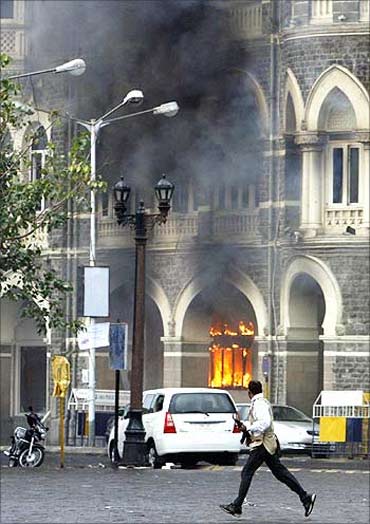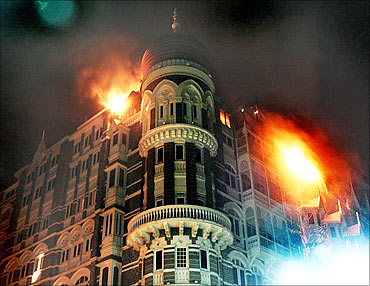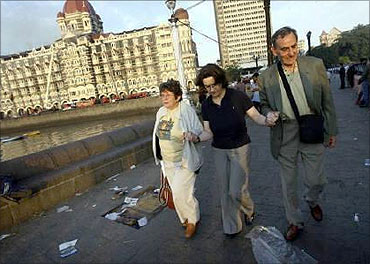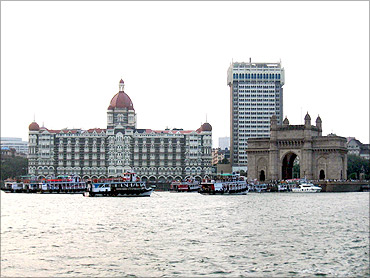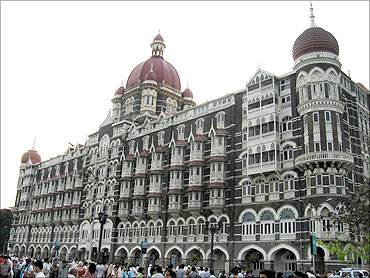 | « Back to article | Print this article |
Taj staff's selfless service, a case study at Harvard
Last updated on: January 27, 2011 17:49 IST
The heroic response by employees of Mumbai's landmark Taj Hotel during the 26/11 terror attacks is now a case study at Harvard Business School that focusses on the staff's selfless service for its customers and how they went beyond their call of duty to save lives.
The multimedia case study 'Terror at the Taj Bombay: Customer-Centric Leadership' by HBS professor Rohit Deshpande documents "the bravery and resourcefulness shown by rank-and-file employees" during the attack.Click NEXT to read on
Taj staff's selfless service, a case study at Harvard
Last updated on: January 27, 2011 17:49 IST
The study mainly focusses on "why did the Taj employees stay at their posts (during the attacks), jeopardising their safety in order to save hotel guests" and how can that level of loyalty and dedication be replicated elsewhere. A dozen Taj employees died trying to save the lives of the hotel guests during the attacks. "Not even the senior managers could explain the behaviour of these employees," Deshpande is quoted as saying in HBS Working Knowledge, a forum on the faculty's research and ideas. Click NEXT to read on
Taj staff's selfless service, a case study at Harvard
Last updated on: January 27, 2011 17:49 IST
Deshpande said even though the employees "knew all the back exits" in the hotel and could have easily fled the building, some stayed back to help the guests.
"The natural human instinct would be to flee. These are people who instinctively did the right thing. And in the process, some of them, unfortunately, gave their lives to save guests." A documentary-style account of events, the case includes video interviews with hotel staff and footage of the attack. It shows how leadership displayed by people in the bottom rank to the top levels in the organisational hierarchy helped in saving lives.Click NEXT to read on
Taj staff's selfless service, a case study at Harvard
Last updated on: January 27, 2011 17:49 IST
It also focusses on the hotel's history, its approach to recruiting and training employees, the Indian culture's "guest is God" philosophy and how the hotel would recover after the attacks. Another key concept of the study is that in India and the developing world, "there is a much more paternalistic equation between employer and employee that creates a kinship." Terming it as one of the "hardest cases" he has worked on, Mumbai-native Deshpande said it was hard to see people confront their trauma again. "We objectify it, keep emotion at a distance, but after 15 minutes of questions with a video camera in a darkened room, there are deeper, more personal reflections of what happened," he says in the HBS Working Knowledge. Click NEXT to read on
Taj staff's selfless service, a case study at Harvard
Last updated on: January 27, 2011 17:49 IST
Deshpande said Taj employees felt a sense of loyalty to the hotel as well as a sense of responsibility to the guests. He cites the example of a general manager who insisted on staying put and help direct a response to the attack even after learning that his wife and sons had died in a fire on the hotel's top floor. "Nothing in the employees' training could have prepared them for such an unprecedented situation," Deshpande said. Deshpande has taught the case in the School's Owner/President Management Executive Education programme. It can also be taught as an example of managing the post-crisis recovery of a flagship corporate brand, he added.
© Copyright 2025 PTI. All rights reserved. Republication or redistribution of PTI content, including by framing or similar means, is expressly prohibited without the prior written consent.
